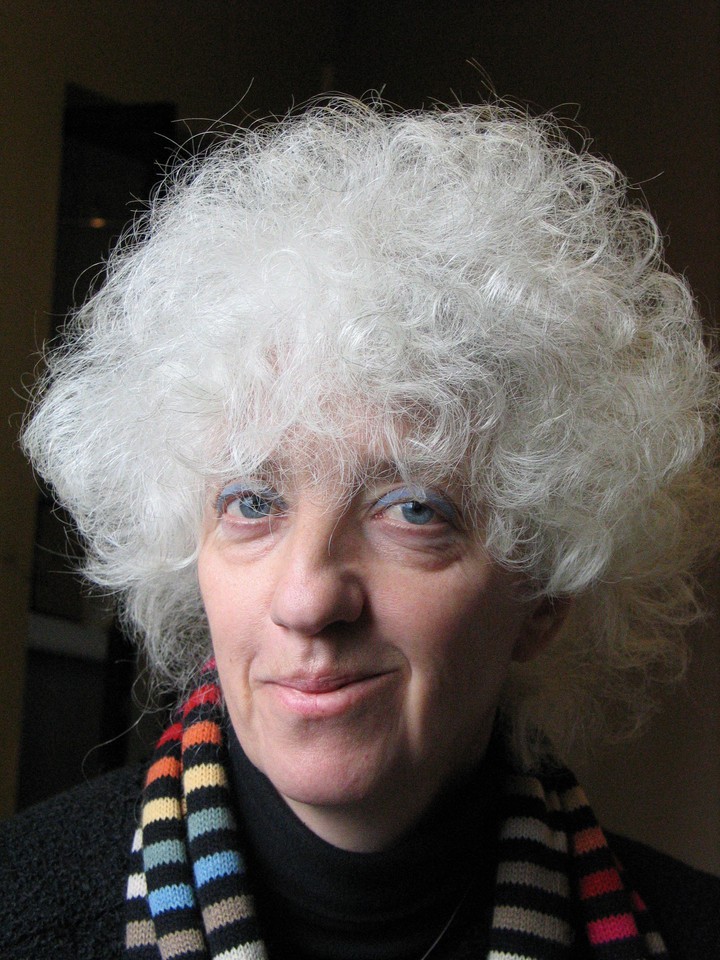
Izabella Gustowska
Urodziła się w
Poznaniu, gdzie mieszka i pracuje. Profesor Uniwersytetu
Artystycznego w Poznaniu na Wydziale Komunikacji Multimedialnej w Katedrze
Intermediów, gdzie prowadzi Pracownię Działań Filmowych i Performatywnych. W
Collegium Da Vinci prowadzi Pracownię Rysunku na kierunku Grafika. Realizuje
prace z zakresu różnych mediów: obiekty malarskie, grafika, fotografia,
instalacje wideo, wideoperformans, film.
Z wystaw
indywidualnych za przełomowe dla dalszych poszukiwań uważa:
– swój
pierwszy wideoperformans „Portret wielokrotny”, Galeria Akumulatory, Poznań
1985;
– prace
związane z bliźniaczością „Względne cechy podobieństwa”, Muzeum Narodowe,
Wrocław 1986;
– obiekty
malarskie z narracją filmową na wystawie „Płynąc”, Galeria Sztuki Współczesnej
Zachęta, Warszawa 1996;
– refleksje
na temat „L’amour Passion” w związkach hetero- i homoseksualnych zawarte w
wystawie „Namiętności i inne przypadki”, Centrum Sztuki Współczesnej, Warszawa
2001;
– eksperyment
z dźwiękiem w trzynastu przestrzeniach wystawy „Śpiewające pokoje”, Muzeum
Okręgowe, Bydgoszcz 2001;
–
retrospektywną wystawę „Life is a Story” z instalacją medialną „Sztuka wyboru”,
Muzeum Narodowe, Poznań 2007.
Za przygodę
artystyczną swojego życia uznaje:
– rozbudowane
w trzynastu przestrzeniach „Media Story SHE”, pokazane na Międzynarodowym
Festiwalu Teatralnym Malta w Poznaniu w roku 2008 i pracę nad filmem „Przypadek
Josephine H...” podczas pobytu na Stypendium Kościuszkowskim w Nowym Jorku w
2013 roku, zakończone 50-minutowym filmem pokazanym m. in. na Międzynarodowym
Festiwalu Filmowym T-Mobile Era Nowe Horyzonty we Wrocławiu w 2014 roku i 11th
Annual Big Apple Film Festival w Nowym Jorku, New Voices, Ancient Echoes:
Polish Women in Film w Nowym Jorku, w Muzeum Sztuki Nowoczesnej w Warszawie i
innych polskich galeriach.
Za
intrygujący uważa czas spędzony na pisaniu książki „Hybryda” wydanej przez
Fundację 9/11 Art Space w 2014 roku.
Za najdłuższy
i wciągający uznaje prowadzony od 2008–2015 projekt zamknięty indywidualnymi
wystawami w 2015:
– Izabella
Gustowska, „Przypadek Edwarda H…”, „Przypadek Izy G…”, Galeria Arsenał
elektrownia, Białystok (kuratorka Monika Szewczyk);
– Izabella
Gustowska, „Nowy Jork i dziewczyna” – z udziałem Anety Grzeszykowskiej, Ady Karczmarczyk, Evy Rubinstein, Galeria Art
Stations, Poznań (kuratorka Agata Jakubowska) i zakończony
publikacją „Izabella Gustowska. Nowy Jork i dziewczyna” wydaną przez Czas
Kultury.
Jest szczęśliwa, że jej prace znajdują się w znaczących muzeach w kraju i za granicą, na przykład w Muzeum Narodowym we Wrocławiu, Museum of Modern Art w Nowym Jorku (prace graficzne), czy w prywatnej kolekcji Grażyny Kulczyk skoncentrowanej na sztuce Europy środkowo-wschodniej, w Muzeum Susch w Szwajcarii (obiekty z lat 90.), a także w domach przyjaciół.
Ważne jest
dla niej podróżowanie blisko i daleko, bo wtedy zbiera impulsy fotograficzne i
filmowe. Lubi zanurzać się w czytaniu, w rozmowach i dźwiękach.
fot. Sławomir Sobczak
ANTONINA \ (kwiecień-grudzień)
Artystka Izabella
Gustowska przez trzy miesiące swojej rezydencji
w CK ZAMEK, będzie zbierać materiały
fotograficzne i filmowe do planowanej w 2020 roku wystawy ANTONINA.
To wystawa medialna o hybrydalnym charakterze, łącząca projekcje, obiekty, obecność
performerów oraz wątki narracyjne. Zostanie ona „zbudowana” w przestrzeniach CK
ZAMEK: w salach wystawowych, w kinie, w korytarzach, wybranych pokojach, w
toalecie damskiej, w windzie i w innych miejscach znalezionych podczas rezydencji
w 2018 roku. Artystka planuje zanurzyć się w codzienność tego miejsca,
podglądać ludzi, sytuacje autentyczne i zderzyć je z zaaranżowanymi planami filmowymi. Materiały filmowe, także archiwalne,
zebrane podczas rezydencji będą wykorzystane w planowanym filmie „Na moście w
Avignon‘’ i na wystawie medialnej o roboczym tytule „Antonina‘’. Ciekawym
zabiegiem będzie zapewne powrót materiałów filmowych do miejsc, w których były
nakręcone. Powstanie specyficzna tautologia, w której narracja filmowa zderzy
się z realną rzeczywistością.
To jednak, co w przestrzeniach wystawy będzie jak powolny letargiczny sen, w
filmie nabierze tempa. Bedzie to więc specyficzne déjà vu i być może wspólnie zadamy sobie
pytanie o prawdę i iluzję obrazu filmowego, o dotyk, zapach, ślady i obecność
ludzi w realnej przestrzeni CK ZAMEK.
Wydarzenia, które odbyły się w ramach rezydencji:
19.04.
SPOTKANIE Z REZYDENTKĄ


